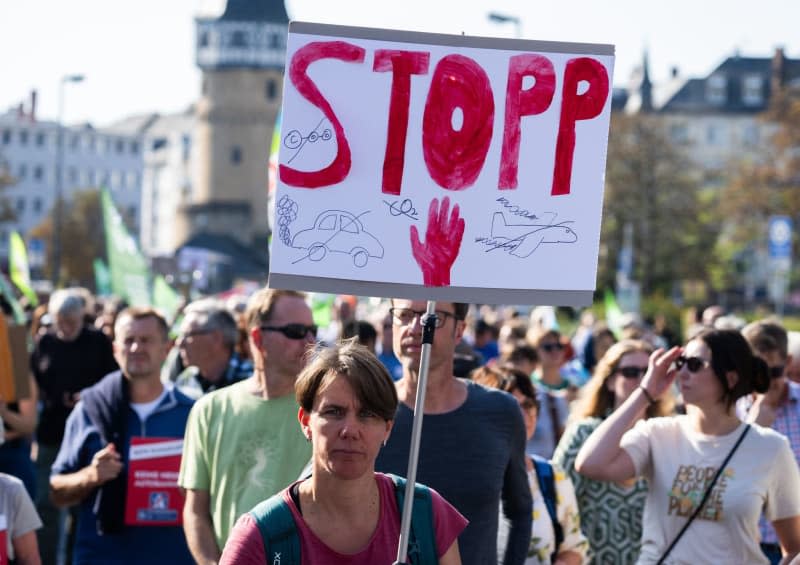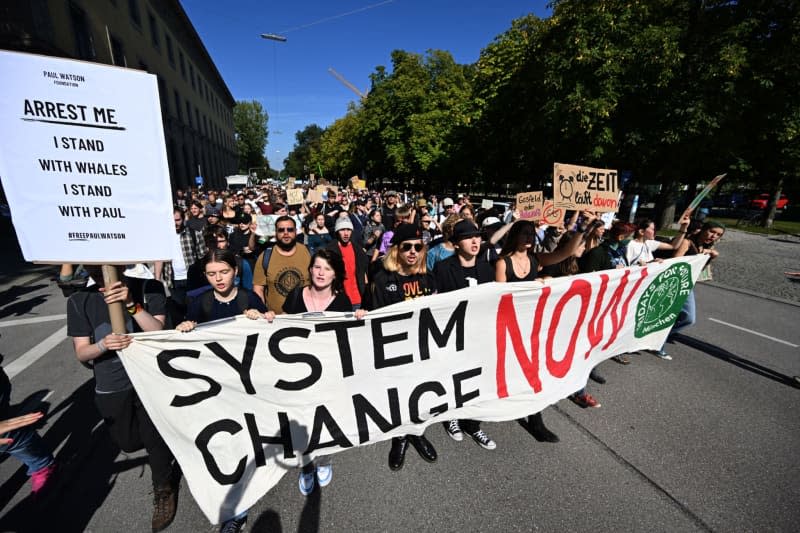Despite somewhat dampened enthusiasm for Germany’s Fridays for Future climate protests, some 75,000 people turned out on Friday for 100 rallies organized in locations across the country.
“We were on the streets today with tens of thousands of people and showed that people do not want to remain passive in the face of the escalating climate crisis, while the federal government is unable to implement concepts for socially just climate policy,” said Annika Rittmann of Fridays for Future Germany.
Official police figures on the total number of participants were not initially available.
Children, young people and adults took to the streets in dozens of cities, including Berlin, Munich, Hamburg and Hanover.
According to the organizers and the police, several thousand people demonstrated in the German capital. The organizers had previously expected 5,000 people.
Protesters carried posters with slogans including “Stop climate change” and “Don’t leave the Earth in the oven too long, or it will burn!”
Police in Munich estimated the number of participants at around 2,600. Demonstrators used the slogan “If nothing changes, everything will change” to express their frustration.
According to police, there were around 1,000 demonstrators in Hanover, while some 600 people took part in Bremen.
Demonstrations were also planned in around 20 cities in North Rhine Westphalia. In Cologne, police said organizers had registered 3,500 participants for a protest march, while 600 turned out in Dusseldorf and 400 in Dortmund.
Protest researcher: Protests depend on public sentiment
Before the start of the coronavirus pandemic, hundreds of thousands of people in some cases took to the streets in Germany for climate protection.
In the meantime, the climate movement has lost some of its momentum. In May, for example, around 1,000 people gathered for a rally in Hamburg, significantly fewer than the 15,000 originally expected by the organizers.
In Munich, too, the number of people present was around 2,000, significantly fewer than the 8,000 that the organizers had previously registered.
According to Simon Teune, a protest researcher at the Free University of Berlin, it is not unusual for protest movements to experience changing levels of support. He says that protests are very dependent on the public mood.
In recent months, the right-wing populist Alternative for Germany (AfD) has been very successful in driving public discussion, Teune explained. That explains why there is currently little room for the climate crisis, he added, even though it is still very much present.
Other crises have dampened enthusiasm for Germany’s Fridays for Future climate protests, spokeswoman Carla Reemtsma said earlier, explaining that the protest on Friday was not expected to draw the same size of crowds that it used to.
Reemtsma told Deutschlandfunk public radio that the climate movement was heavily dependent on the political context.
“These are massive crises, be it the Covid-19 pandemic, the Russian war of aggression against Ukraine, and subsequently inflation, the rising cost of living, the energy crisis, which naturally unsettles many, many people,” she said. The movement did not blame anyone for currently focusing on other issues.
“Politicians are responsible, regardless of the circumstances, for protecting our livelihoods,” she emphasized.
Movement founded by Sweden’s Greta Thunberg
When asked whether the movement was missing its figurehead Greta Thunberg, Reemtsma said: “The good thing is, we have always been a very broadly based movement from the beginning, and now we are active again in over 110 cities, taking to the streets. I think you can see, we can protest very well even without her.”
Thunberg first sat in front of her school in Sweden in 2018 and went on strike for climate protection, thus founding the Fridays for Future movement.
Most recently, she has come under criticism for her comments on Israel, accusing it of genocide in the Gaza Strip.
The German section of Fridays for Future has distanced itself from her remarks.











